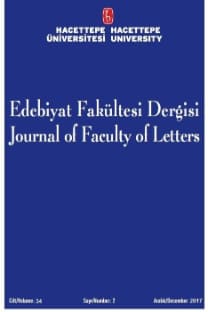Salman Rushdie’nin “Yorick” Adlı Kısa Öyküsünde Üsteleştiri
Salman Rushdie, “Yorick”, üsteleştiri, yaratıcı üsteleştiri
Metacriticism in Salman Rushdie’s Short Story “Yorick”
Salman Rushdie, “Yorick”, metacriticism, creative metacriticism,
___
- Al-Shara, Z. A. (2009). Creative metacriticism: The portrayal of literary theory in contemporary fiction.PhD Dissertation, Western Michigan University, Paper 640. Retrieved from http://scholarworks.wmich.edu/dissertations/640/ Davies, B. (2000). A body of writing: 1990-1999. New York and London: AltaMira Press. Davis, R. G. (2000). Salman Rushdie’s East, West: Palimpsests of fiction and reality. Passages, 2 (1), 81-91. Ghose, I. (2010). Jesting with Death: Hamlet in Graveyard. Textual Practice, 24 (6), 1003-1018. Ghosh-Schellhorn, M. (1998). Transitional identitiy and its indentured emplacement. In E. R. Alfred Hornung (Ed.), Postcolonialism and autobiography (pp. 167-186). Amsterdam and Atlanta: Rodopi. Golban, P. (2014). Victorian critics and metacritics: Arnold, Pater, Ruskin and the independence of literary criticism. Humanitas, (3), 47-68. Guerrero-Strachan, S. R., and Hidalgo, A. S. (2008). The fooler fooled: Salman Rushdie’s hybrid revision of William Shakespeare’s Hamlet through ‘Yorick’. In C. D. Kapadia (Ed.), Native Shakespeares: Indigenous appropriations on a global stage (pp. 73-87). Ashgate Publishing. Henderson, G. E., and Brown, C. (1997, March 31). Glossary of literary theory. University of Toronto English Library. Retrieved from http://www.library.utoronto.ca/utel/glossary/Metacriticism.html Kapadia, P. (2008). Transnational Shakespeare: Salman Rushdie and intertextual appropriation. Borrowers and Lenders: The Journal of Shakespeare and Appropriation, 3 (2), 1-21. Lodge, D. (1971). The novelist at the crossroads and other essays on fiction and criticism. Ithaca: Cornell University Press. Mack, M. (1952). The world of Hamlet. The Yale Review, 41, 502-523. Mendes, A. C. (2016). Salman Rushdie in the cultural marketplace. London and New York: Routledge. Nogueira, A. L. (2002). Shakespeare’s Hamlet, Salman Rushdie’s “Yorick,” and the dilemmas of tradition. In A. d. Resende (Ed.), Foreign accents: Brazilian readings of Shakespeare (pp. 138-153). Newark and London: Rosemont Publishing. Popper, K. (1974). The philosophy of Karl Popper. (P. A. Schilpp, Ed.) La Salle, IL: Open Court. Ravel, S. (1981). Metacriticism. Athens: The Univesrity of Georgia Press. Rushdie, S. (1994 [1996]). East, West.New York: Vintage Books. Rushdie, S. (1992). Imaginary homelands. London: Penguin. Rushdie, S. (1988). Minority literatures in a multi-cultural society. In A. R. Kirsten Holst Peterson (Ed.), Displaced persons (pp. 33-42). Mundelstrup: Dangaroo
- ISSN: 1301-5737
- Yayın Aralığı: 2
- Başlangıç: 1983
- Yayıncı: Emine Erdoğan Özünlü
When Daedalus Meets Orpheus: Edwin Morgan’s Science-Fiction Poetry
The Uses of Storytelling in Khaled Hosseini’s The Kite Runner
İsteme Özgürlüğünden Eylem Özgürlüğüne: Kant’ın Özgürlük Görüşü*
Türkçede hareket olgusu bileşenleri ve jestlerle dilselanlatım
Salman Rushdie’nin “Yorick” Adlı Kısa Öyküsünde Üsteleştiri
Salman Rushdie’nin Yorick Adlı Kısa Öyküsünde Üsteleştiri
Mim Kara’nın Doğuya Hüzün Turları Adlı Yapıtında Doğunun ve Batının Koordinatlar
Mümin HAKKIOĞLU, Çağlayan DOĞAN
İsteme Özgürlüğünden Eylem Özgürlüğüne: Kant’ın Özgürlük Görüşü
Çocuk Edebiyatı Bağlamında Gülten Dayıoğlu’nun Fadiş Romanı
